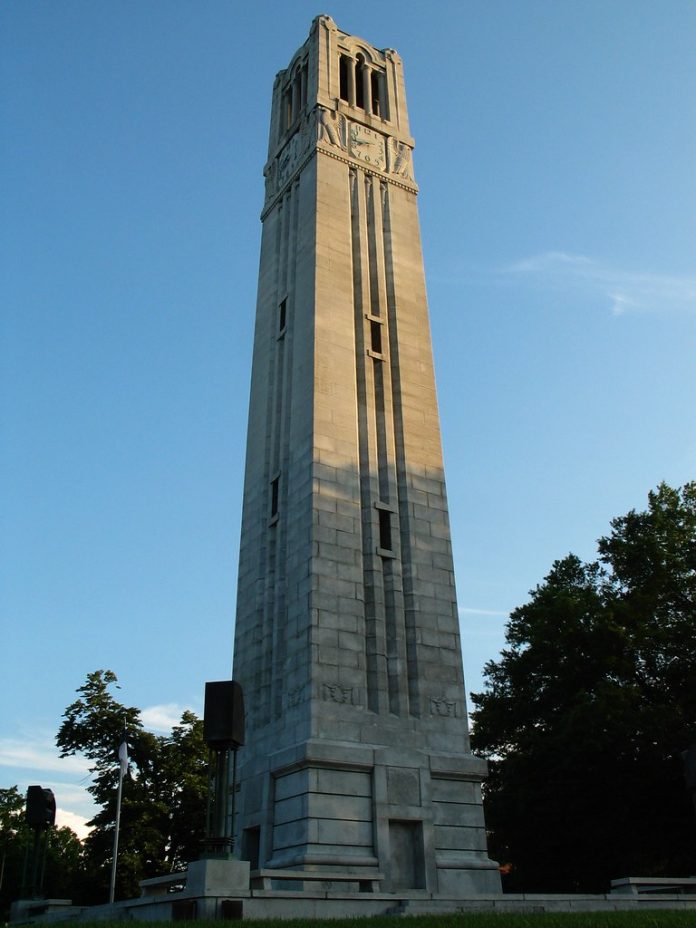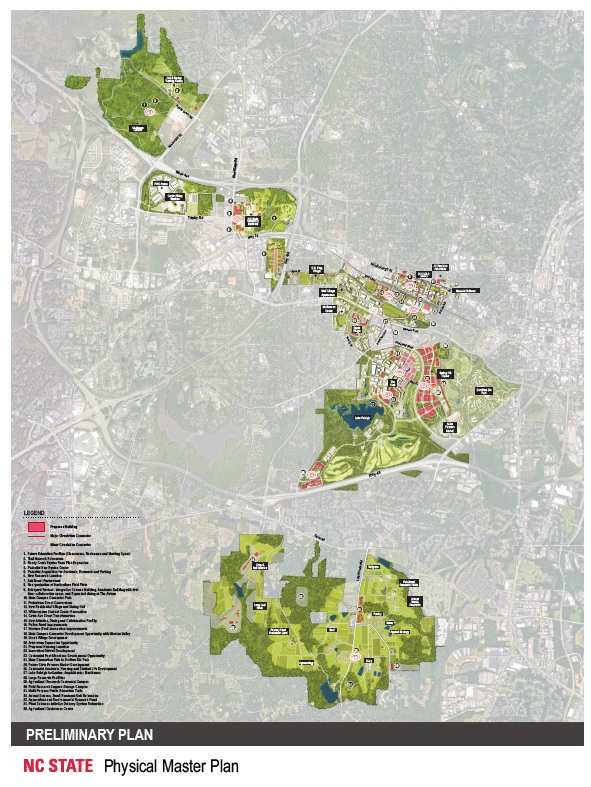North Carolina State’s great land grab is encouraged by public policies that reward universities as landlords and developers.
North Carolina State University’s campus is nestled in the heart of downtown Raleigh, but its physical footprint continues to grow and will eventually span from Hillsborough Street to U.S. Highway 40. A result, largely, of adherence to the Centennial Campus master plan, NCSU’s real-estate holdings prompt a question: Why does a single university need so much property?
NCSU is quite the busy real-estate mogul, with an entire website dedicated to its properties available for lease. NCSU has been accumulating property for years, and, most recently, it has set out to acquire the University Towers property, its latest move in the attempt to buy up all of Hillsborough Street.
Earlier this year, the UNC System authorized $29.6 million for the purchase of University Towers, a privately owned dormitory. NCSU will use this property to expand its student housing options, but not before extensive renovations. The UNC System also approved $22 million for those costs.
In total, then, NCSU will spend $52 million in state funds to scoop up this new property. That doesn’t include the cost to lease the property while the purchase is outstanding. According to the Raleigh News & Observer, “The Board of Governors authorized the university to sign a six- to 10-month lease for the building beginning July 31. The lease will end once the purchase agreement is finalized.”
Why is NCSU so interested in real estate? One large reason is that many such properties can function as a source of profit. NCSU can lease office and business spaces on its Centennial Campus; indeed, its real-estate website boasts over “5 million square feet of commercial space” and currently houses over 70 businesses. Another major draw of accumulating real estate is that universities don’t have to pay property taxes; no tax payments means more profit for institutions to hold onto.
As the Martin Center shared in a previous article, “NC State entered into this type of economic development when it created Centennial Campus in 1987. The leasing of property to private organizations, in direct competition with other local landlords, only became possible because of an exemption to the Umstead Act. The General Assembly created such an exemption expressly for Centennial Campus in 1997.”
Following the major success of the Centennial Campus in attracting tenants, similar exemptions have been made for other UNC-System institutions. Yet the relevance of these campus expansions to the mission of higher education is less than clear. Economic development appears to be the main motive behind these real-estate endeavors. In other words, NCSU (and countless other institutions) are attempting to be businesses rather than universities.
In the case of University Towers, the argument can be made that this property is useful for mitigating the institution’s overwhelming housing needs; that argument doesn’t hold much weight, however, when one considers the institution’s “master plan” for development.
The offerings included in the “master plan” are not merely for students or educational advancement. Instead, the Centennial Campus “is a resource for everyone, from local residents to leading researchers from around the world.” That includes people and businesses from outside the university community who merely want to lease office space or property.
NCSU isn’t the only university that’s capitalizing on real-estate ventures. Universities nationwide are expanding their real-estate portfolios. New York University’s (NYU) expansion plan has caused consternation among Greenwich Village residents for over a decade. And numerous Ivy League schools have massive real-estate holdings, as well as other concerns. An article in Slate suggests that “a university is now the largest employer in two-thirds of America’s 100 largest cities (and a handful of states as well).” Reonomy, meanwhile, reminds the reader that “Yale University is New Haven’s largest landlord.”
Universities leasing property has been a controversial topic in North Carolina over the years, with some questioning the propriety of the situation due to the original Umstead Act. This act makes it unlawful for the state to provide services or goods in competition with N.C. citizens and businesses. Yet, over the years, changes have been made to the act, allowing universities to continue expanding their offerings despite the toll this growth has had on local businesses. An example is the aforementioned exemption given to NC State, as well as other universities in the UNC System.
State-funded real-estate ventures do have drawbacks. For instance, there is no real benefit to a school that sells property, because any profit goes back to the state. That makes sense when you consider that the funds originated with the state to begin with; however, it does add a layer of nuance to the situation. Why sell extra or unused property knowing there is no benefit to you (the school) when you could instead lease the property to a business that will pay to use the space? It’s simply a matter of choosing an option that is profitable versus one that is unprofitable. There needs to be some incentive for universities to sell real estate; otherwise, they will simply continue to make new purchases without purging any properties they don’t use.
Institutions are meant to be educational powerhouses, not top-of-the-line real-estate investors. Economic advancement should come second to educational excellence. A nice campus, while a cushy benefit, shouldn’t be the main draw of a university. Institutions should invest their time and money into providing a quality education that adequately prepares students for successful careers and to be engaged citizens.
Ashlynn Warta is the state reporter for the James G. Martin Center for Academic Renewal.
Originally published by The James G. Martin Center for Academic Renewal. Republished with permission.
For more School Reform News.









